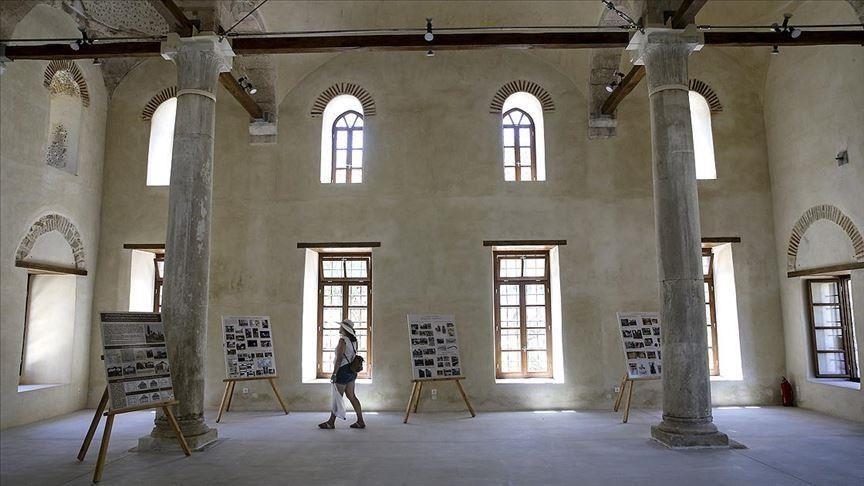
ISTANBUL
Greece's move to use Ottoman-era mosques for different purposes by keeping them closed to worship is seen as a violation of the principle of reciprocity that secures the freedom of religion, according to an expert.
Evaluating the current status of historic mosques in Greece, Sabri Can Sannav from the History Department at Trakya University told Anadolu that the Mecidiye Mosque was converted into the Byzantine Museum of Chios in 1912 when the island was under the control of Greece.
Slamming Greece for its practice of shutting down historic mosques in the country dating back to Ottoman times, Sannav said: "Mecidiye Mosque underwent a great change and lost its historical character to a significant extent," and added that the museum now hosts Christian artifacts and Muslim and Jewish gravestones.
Also, Sannav said the Mecidiye Mosque is "almost the only Ottoman structure on the island that has survived in its entirety."
Underlying the contrast between religious freedom in Türkiye and Greece, he said Muslims cannot worship in historic mosques on Chios, while the Christian community is free to perform religious services in churches on the coast of Izmir's Cesme district.
"Today, non-Muslims can freely pray in their own religious establishments in many parts of our country. Christians can come to Cesme and pray freely in churches. Why can't Muslims pray in Mecidiye Mosque or other mosques on Chios?" he said.
In the last 20 years, Türkiye has opened approximately 84 Greek-Orthodox churches, dating back to the 19th century in Edirne, Cesme, Alacati, Ordu, Gemlik, and other places, which do not even have a congregation, to worship on certain days, he noted.
The Suleymaniye Mosque on Rhodes is also closed to worship," he added, saying: "Today, as in the past, Greece failed to adhere to reciprocity in securing the religious rights of the Muslim community."
Meanwhile, an associate professor of architecture from Marmara University, Neval Konuk, said: "We have four imperial Ottoman mosques standing on Chios."
"One of them, the Bayrakli Mosque, is used as a warehouse for an electrical appliance repair shop. Mecidiye Mosque was converted into a museum immediately after the occupation and is still used as a museum today, while Osmaniye Mosque and Orhaniye Mosque are used forr storage of artifacts from archaeological excavations," Konuk said.
Architectural works built during the Ottoman period in Greece are not registered as Ottoman or Turkish works but as Muslim architecture, Konuk said, adding that Greece follows a policy of "ignoring Ottoman-Turkish structures within its borders."
Greece ignores Ottoman buildings constructed in the period after the 1821 Greek uprising against the Ottomans, while there were 8,500 buildings built during the Ottoman rule in the Greek records, she stressed.
According to Konuk's field research, around 20,000 structures dating back to the Ottoman era were present in Greece despite the war, deliberate policies of demolition, and development plans.
Criticizing Greece for its unnatural restoration of Ottoman-era buildings that "erases traces of the original purpose of buildings," she said some are restored in a way to make them resemble Byzantine architecture.
Despite the Ottoman rule from 1566 to 1912 in Chios, there was only an Ottoman cemetery named Karaali Cemetery, while tombstones belonging to Muslims in the Ottoman period collected from other cemeteries were randomly placed in areas serving as an open-air exhibition museum, she said.
Greece removes minarets or inscriptions from mosques, Konuk also said, noting: "When we look at historic public buildings, we see that their inscriptions were destroyed, and plasters are used to cover traces of architecture."
Anadolu Agency website contains only a portion of the news stories offered to subscribers in the AA News Broadcasting System (HAS), and in summarized form. Please contact us for subscription options.







